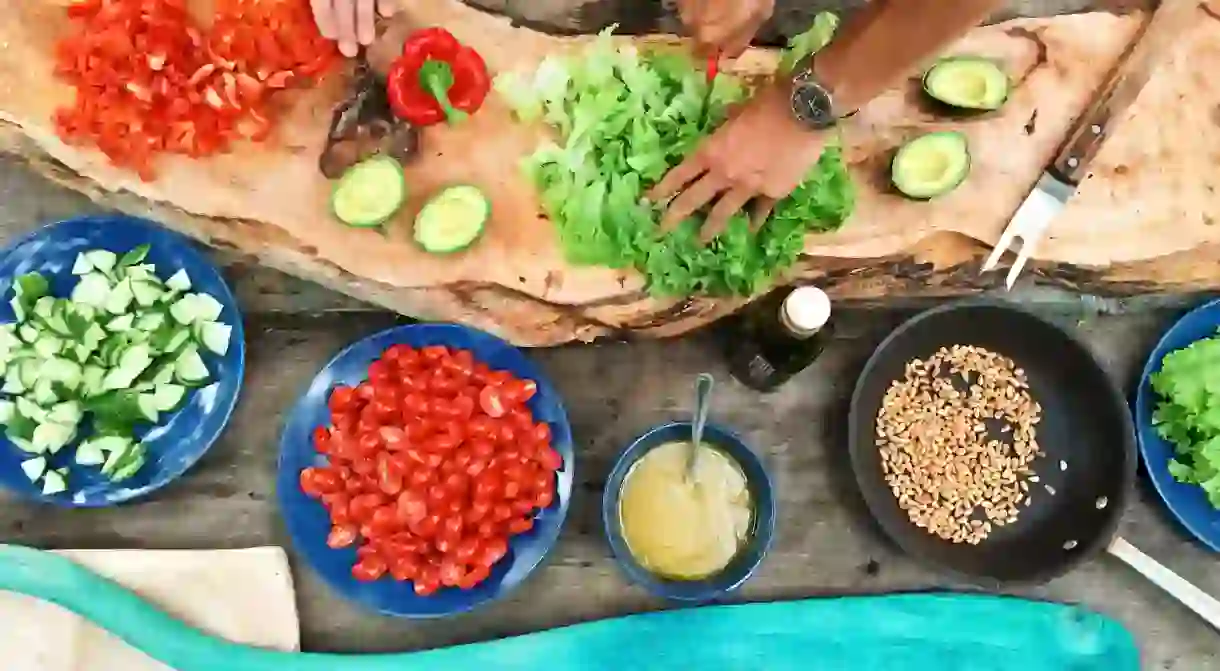6 Things You'll Find in an Israeli Kitchen

Israeli cuisine is not only considered healthy and fresh, it is also versatile and made up of a fusion of Oriental, Mediterranean, Middle-Eastern and Western-style kitchens. Even though there are things that not all Israeli families can or know how to make at home, there are some that every single Israeli would agree on. Check out the following list to see what things every Israeli is sure to have.
Tahini

Perhaps the most prominent staple at any Israeli kitchen, tahini is a condiment made of ground toasted sesame seeds.Usually served in the form of a paste, as a dip, or used for cooking, tahini is a major component of many favourite foods like hummus, baba ghanoush, and halva. In Israel, you will notice tahini comes as a topping on just about anything. Whenever you have a salad, falafel, sabich, shwarma, or any kind of dish, you will have some tahini on your plate. While it’s full of B vitamins, calcium and iron, it’s also calorie dense and contains a lot of fat.
Black coffee

Israelis love coffee and black coffee, which is essentially finely ground unfiltered coffee, in particular. You can make black coffee two different ways. The first is called “Kafe Turki” or “Kafe Shachor” (black coffee), and is done by cooking the ground beans in a small coffee pot named a Finjan. The uncooked version that is unique to Israel is most commonly known as “Kafe Botz” (mud coffee), and is made by just boiling the beans along with water, sugar, and some cardamon. Making Israeli black coffee is a tradition when hiking or picnicking in nature, when working in a kibbutz, while serving in the army or after every Israeli/Arab traditional meal such as hummus, falafel, and shawarma.
Arak

Arak is a clear, colourless, unsweetened anise-flavoured distilled alcoholic drink. This is the traditional alcoholic beverage in the Middle East, especially in the Levant but also in Iran and Turkey. Arak is distilled using either grapes or dates, along with dried aniseed, which provides the drink with its unique flavour. In Israel, Arak is usually consumed with some water and ice, which turns the clear liquid into a translucent, milky-white colour. Another popular option is to mix Arak with lemonade or grapefruit juice, making it an ultimate beach-side refresher, and a perfect choice for the Israeli hot summer days.
Cottage cheese

A fresh cheese curd product, Israeli cottage cheese is drained but not pressed, so that some whey remains and the individual curds remain loose. Made only with milk and sea-salt, cottage cheese is very popular in Israel and was, for many years, subsidised by the government as a basic product for everyday consumption. The most popular manufacturer and the one who first brought it to Israel is the company Tnuva, who branded the product as a staple product for any Israeli fridge, making it an icon of home and family in Israel.
Challa

Challa is a special bread popular in Jewish cuisine all over the world. Somewhat similar to the French brioche, Challa is a buttery sweet bread usually braided and eaten on Shabbat and ceremonial occasions, such as family dinners or holidays. Although eating Challa on occasions is a Jewish tradition, this delicious fluffy bread is eaten by Israeli families whenever and wherever they can. On Friday mornings, it will be hard to stumble upon a market, bakery, grocery store or restaurant that doesn’t offer a freshly-baked Challa for you to indulge in during Shabbat, along with Shakshuka, tahini, cottage cheese or any dip you can think of.
Bamba
On the market since 1964 with no decline in sales, Bamba makes up 25% of the Israeli snack market. A peanut-flavoured salty snack manufactured by Osem cooperation, Bamba is produced and sold in Israel and internationally. Bamba contains no preservatives or food colouring, is enriched with vitamins but does contain large amounts of fat and salt. There is absolutely no Israeli child who doesn’t know Bamba, and you will see many Israeli families travelling abroad with a supply of this favourite snack.














